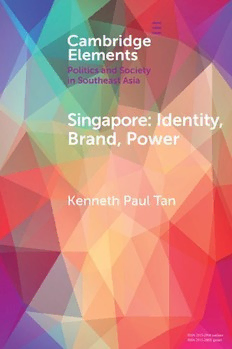
Singapore: Identity, Brand, Power PDF
Preview Singapore: Identity, Brand, Power
ElementsinPoliticsandSocietyinSoutheastAsia editedby EdwardAspinall AustralianNationalUniversity MeredithL.Weiss UniversityatAlbany,SUNY SINGAPORE Identity, Brand, Power Kenneth Paul Tan National University of Singapore UniversityPrintingHouse,CambridgeCB28BS,UnitedKingdom OneLibertyPlaza,20thFloor,NewYork,NY10006,USA 477WilliamstownRoad,PortMelbourne,VIC3207,Australia 314–321,3rdFloor,Plot3,SplendorForum,JasolaDistrictCentre, NewDelhi–110025,India 79AnsonRoad,#06–04/06,Singapore079906 CambridgeUniversityPressispartoftheUniversityofCambridge. ItfurtherstheUniversity’smissionbydisseminatingknowledgeinthepursuitof education,learning,andresearchatthehighestinternationallevelsofexcellence. www.cambridge.org Informationonthistitle:www.cambridge.org/9781108460460 DOI:10.1017/9781108561273 ©KennethPaulTan2018 Thispublicationisincopyright.Subjecttostatutoryexception andtotheprovisionsofrelevantcollectivelicensingagreements, noreproductionofanypartmaytakeplacewithoutthewritten permissionofCambridgeUniversityPress. Firstpublished2018 AcataloguerecordforthispublicationisavailablefromtheBritishLibrary. ISBN978-1-108-46046-0Paperback ISSN2515-2998(online) ISSN2515-298X(print) CambridgeUniversityPresshasnoresponsibilityforthepersistenceoraccuracyof URLsforexternalorthird-partyinternetwebsitesreferredtointhispublication anddoesnotguaranteethatanycontentonsuchwebsitesis,orwillremain, accurateorappropriate. Singapore Identity,Brand,Power DOI:10.1017/9781108561273 Firstpublishedonline:August2018 KennethPaulTan NationalUniversityofSingapore Abstract:ContemporarySingaporeissimultaneouslyasmallpostcolonial multiculturalnation-stateandacosmopolitanglobalcity.Tomanage fundamentalcontradictions,thestatetakestheleadinauthoringthe nationalnarrative.Thisispartlyaninternalprocessofnationbuilding,but itisalsoachievedthroughmorecommerciallymotivatedandoutward- facingeffortsatnationandcitybranding.Bothsetsofprocesses contributetoSingapore’scapacitytoinfluenceforeignaffairs,ifonlyfor nationalself-preservation.Forasmallstatewithresourcelimitations,thisis mainlythroughtheexerciseofsmartpower,ortheabilitytostrategically combinesoftandhardpowerresources. Keywords:Singaporepolitics,society,andculture,Gramscianhegemony, Legitimacy:democracy,performance,moralauthority,Multiculturalism: race,language,religion,Creativecity,globalcity ©KennethPaulTan2018 ISBNs:9781108460460(PB),9781108561273(OC) ISSNs:2515-2998(online),2515-298X(print) Contents 1 Singapore’sPoliticalDevelopmentthroughCultural andIdeologicalLenses 1 2 IdeologicalSourcesofSingapore’sHegemonicState 4 3 AMultiracial,Multilingual,andMulti-religious Nation-State 20 4 ACosmopolitanGlobalCity 33 5 CivilSocietyandPublicEngagement 42 6 NationandCityBranding 47 7 TheSoftPowerofaSmallState 56 8 TheFutureoftheHegemonicState 61 References 64 PoliticsandSocietyinSoutheastAsia 1 1Singapore’sPoliticalDevelopmentthroughCulturaland IdeologicalLenses Sinceachievingindependencein1965,Singaporehastodaybecomeoneofthe mosteconomicallyprosperouscountrieswithoneofthemostopeneconomies intheworld(Segarra,2017).Andyet,affluentSingapore’sessentiallyparlia- mentary political system, dominated by an authoritarian state concerned fundamentally with existential matters of national survival and economic prosperity, has not evolved straightforwardly into a more competitive and expansivelyparticipatorydemocraticsystemthatprivilegeshumanrightsand freedoms. Modernization theory – still influential in the field of comparative politics–predictssuchatransition(InglehartandWelzel,2009;Peerenboom, 2008;Fukuyama,1992).AmericanacademicChristopherLingle(1996),not- ing a gradual decline of electoral support for the ruling party, critiqued as unsustainable Singapore’s ‘authoritarian capitalism’, which he described as acombinationofselectiveeconomicfreedomswithtoughpoliticalcontrolthat rewardedloyaltyandsycophancy. MuchlessconfidentaboutSingapore’spathtodemocratizationandliberal- ization was political scientist Hussin Mutalib (2004: 28), who described Singapore as the most illiberal of democracies. He noted the ruling party’s ‘abhorrenceofaparliamentaryOpposition’andtookapessimisticviewofthe prospectsofoppositionpolitics.ChuaBengHuat(2017),asociologist,argued thattheSingaporegovernmentwasantipathetictowesternliberaldemocracy, groundingitshegemonyonareconstructedsocialdemocraticideologythatwas presentattheparty’sfounding.Twodecadesearlier,Chua(1997a)hadalready criticallyexaminedtherulingparty’seffortstoproduceanideologyof‘Asian communitarianism’asthebasisofananti-liberal‘Asiandemocracy’.Cherian George (2017), a journalist-turned-academic, wrote about and against the resilience of the Singapore government’s authoritarianism, arguing in favour ofpoliticalliberalizationasameansofrevitalizingtheestablishment.Allthree Singaporean academics – Mutalib, Chua, and George – have concluded that Singapore’spoliticalsystemhasbeenandwilllikelycontinuetoberesistantto democratization andpolitical liberalization accordingtowestern, particularly US,versions. In this Element, I note that there have been alternating cycles of political liberalization and repression, though the trend overall has been towards increasinglevelsofpoliticalsophisticationamongtheestablishment,thegrow- ing alternative and oppositional elites, and the electorate. I argue that Singapore’spoliticaldevelopmentisbetterunderstoodbypayinggreateratten- tiontothe ideological and cultural negotiations that occur inparallel withits 2 Singapore:Identity,Brand,Power materialsuccessesandfailures.Thisisnottosaythatadeeplyrootedpolitical culture or ideological predisposition constrains democratic prospects in Singapore.Rather,itisthecontinuousworkofshapingandcontestingculture andideologythatcreatesitsever-changingandnon-linearcontoursofpolitical possibility.InthisElement,Ifocusinparticularontheideologicalandcultural negotiations that occur in the interdependent tasks of nation building, nation andcitybranding,andtheexerciseofsoftpower. It is useful to think of contemporary Singapore, for all its complexity, as havingadualnature:Singaporeissimultaneouslyasmallpostcolonialmulti- culturalnation-stateandacosmopolitanglobalcityofthetoprank.Thisduality has produced a dynamic variety of contradictions and tensions, which have madeallthemorechallengingthetaskofkeepingtheauthoritarianSingapore systemstable,durable,andsuccessful.Foronething,thestatehashadtoexert continuous effort to contain, rather than resolve, these contradictions in apragmatic(thatistosay,adaptiveandundogmatic)fashionwhilstdirecting the public narration of a coherent and persuasive story that is acceptably meaningful and even inspiring to Singaporeans and other countries looking for ideas, role models, and partners for development and governance. This balancingactpartlyinvolvesaninternalprocessofnationbuilding,butitisalso achievedthroughmorecommerciallymotivatedandoutward-facingeffortsat nation and city branding. Both sets of processes contribute to Singapore’s capacitytoinfluenceforeignaffairs,ifonlyfornationalself-preservation.For asmallstatewithresourcelimitations,thiswillmainlybethroughtheexercise ofsoft(persuasiveandattractive)power,which–whenstrategicallycombined with hard (military and economic) power – gives Singapore what former HarvardKennedySchooldeanJosephNye(2013)called‘smartpower’. InthisElement,Ianalysetheincreasinglymultivocalandcontestednatureof the Singapore narrative – undergirding its national identity, brand, and soft power – by adopting a critical-analytical approach, inspired by Antonio Gramsci, which is centred on the notion of ideological hegemony. In an advanced capitalist state like Singapore, the dominant classes assume moral leadershipbyforgingnationalconsensusamongthediverseclassesandsocial forces. They do this by actively and conscientiously working through their intellectualsandorganicinfluencewithincivilsociety.Nottobeconfusedwith more straightforward notions of domination, Gramscian hegemony is an unending struggle and a dynamic ‘process of creating and maintaining con- sensusorofco-ordinatinginterests’withinshiftingrelationsofdominationand subordination (Slack, 1996: 144, 117–18). Developing this idea, Ernesto Laclau(1977:161)arguedthata‘classishegemonicnotsomuchtotheextent thatitisabletoimposeauniformconceptionoftheworldontherestofsociety, PoliticsandSocietyinSoutheastAsia 3 buttotheextentthatitcanarticulatedifferentvisionsoftheworldinsuchaway thattheirpotentialantagonismisneutralized’.Anotherwaytothinkofthisisto saythathegemonyisachievedinacapitalistsocietywhencommonelements within discourses associated with different potentially antagonistic classes – dominant,subordinate,subaltern,etc.–arealigned. Theresultofcontinuousstruggle,negotiation,andcompromise,hegemonyis thebasisofpopularconsentandpoliticallegitimacy,thoughitusuallyco-exists withotherresidualandemerginghegemonicformations.Hegemonyis,therefore, acomplexarticulationthat–evenatitsmostdominantstate–remainsunstable andevenfragile.Asaconceptualtool,itisusefulforanalysinghowconsensus, achieved by connecting and containing contradictions, can just as easily be disarticulated,ifpulledapartbypressuresfromshiftingmaterialcircumstances– such as those relating to economic conditions – and their resultant changes in consciousness. Hegemony can weaken as emergent social forces forge new alliances and movements with new value systems in an ideological struggle. Thus,themaintenanceofhegemony–anactiveprocessoflegitimation–requires continuousideologicalwork,particularlyaschangingcircumstancesleadtonew experiencesofmaterialdisadvantageandtheemergenceofalternativeconscious- ness.InSingapore,asChua(1997a:4)arguedinhisimportantworkontheforging ofa new consensus around an Asian communitarian ideology in the 1990s, the ‘politicalandideologicalworkofthegoverningis,therefore,neverdone’. WhiletheSingaporestateattemptscontinuallyandsystematicallytoconstruct a widelyacceptableideologicalbasisforpoliticalreasons andjustifications,at theheartofwhichisthenationalnarrative,itsbrandofauthoritarianismresorts onlyextraordinarily–andthusrarely–totheexerciseofbruteforce.Coercion,in the form of more overt acts of political repression, is therefore the state’s last resort(Gramsci,1971:269),appliedwhenideologicalandculturaleffortsseem tohavefailed.Theoccasionalbuthighlytacticaluseofdetentionswithouttrial, lawsuitsfordefamation,andcensorship–alongwithpressureappliedbehindthe scenes–allcontributenotonlytoasilencingofoppositionalandsometimeseven justalternativevoicesbutalsotoalow-frequencycultureofanxietythatnudges many to constrain themselves in a mode of self-censorship (Tan, 2007; Tan, 2016).George(2007)arguedthatmoststatesdeployrepressivetools‘rationally and with finesse’ in order to consolidate authority, noting in particular the Singaporegovernment’sexerciseof‘calibratedcoercion’torepressitspolitical challengers‘withminimumpoliticalcost’.Thisleavestheworkofmaintaining ideologicalhegemonytoproceed,Iargue,bydrawingonatleastthreesourcesof legitimacy: the mandate arising from regular Westminster-style political elec- tions, the successful delivery of material goods, and the leadership’s moral authoritytorule. 4 Singapore:Identity,Brand,Power In this Element, I will discuss these three ideological sources and how they relate to one another. I will then analyse how these legitimating sources are strained by the contradictions that arise from Singapore’s dual nature of nation-state and global city, focussing on race, language, and religion in the nation-state and on material inequalities, creativity, and new identity politics in the global city. I will then briefly discuss how these contradictions manifest themselves in civil society, the primary location of ideological and cultural conflicts and negotiations, before examining the state’s efforts to (re-)engage the citizens in national-level consultation exercises. I will then analyse how the state, driven primarily by commercial reasons and a marketing logic, produces both an inward- looking and outward-facing Singapore image, conceived as a nation/city brand that can also help to make Singapore attractive and disproportio- nately influential in international affairs. 2IdeologicalSourcesofSingapore’sHegemonicState Togainandsecurepopularconsent,throughabasicsocialcompact,theauthor- itarian state seeks to renew a strong democratic mandate through regular electionsand,whileinpower,ensuresthatitsextensivepoliciesandprogrammes deliver results that people desire: security, wealth, social services, and a well- designed city that is liveable, for instance. Such a transactional relationship, thoughnecessary,isnotsufficientforsecuringlastinglegimacy.Thus,thestate alsopaysattentiontothetransformationaldimensionthatgivesitmoralauthority andanemotionalappeal. 2.1DemocraticMandate Although Singapore displays all the formal features of a liberal democracy, havinginheritedthesystemfromalmostacenturyandahalfofBritishcolonial rule (1819–1963), what it lacks is electoral competitiveness. The ruling People’s Action Party (PAP) has continued to win a significant majority of parliamentaryseatssinceSingaporeachievedself-governmentin1959(infact, every seat in general elections fought between 1968 and 1981). This incum- bency,combinedwithformalandinformalinfluenceovermajorstateinstitu- tions,creativeadjustmentstotherulesofthegame(includinggerrymandering), and widely recognized governmental success, has bestowed on it significant structuraladvantagesthatseverelylimittheprospectsofoppositionpoliticsin the foreseeable future. In consequence, general elections seem unfair even thoughtheyareuniversalandfreebyinternationalstandards.ThePAPpublicly interprets the results of each election as a strong continuous signal of the
